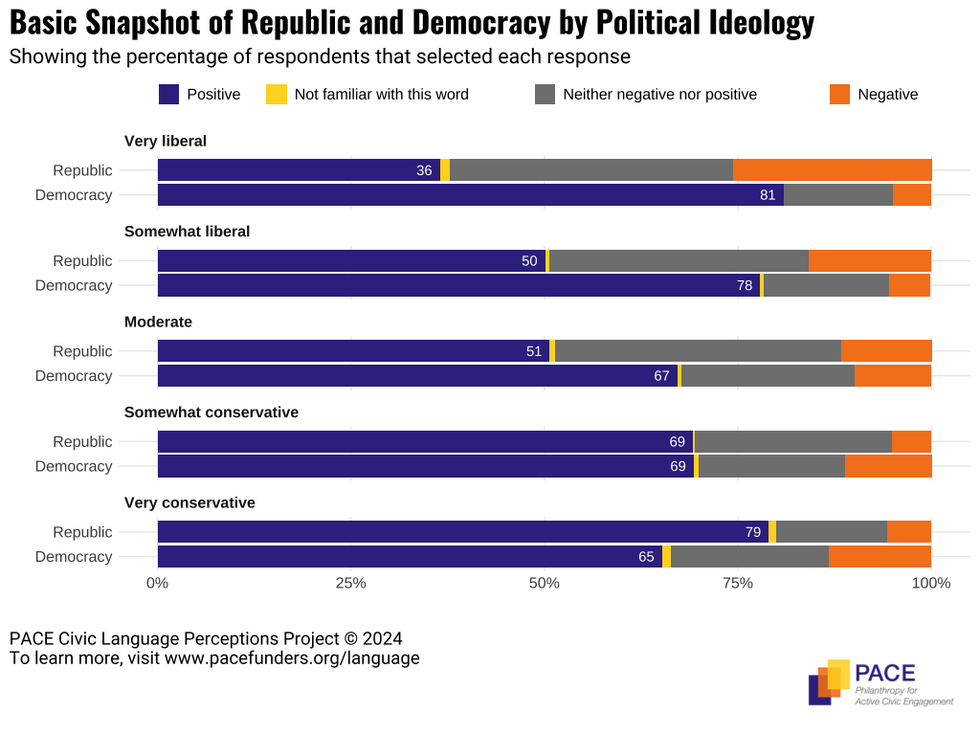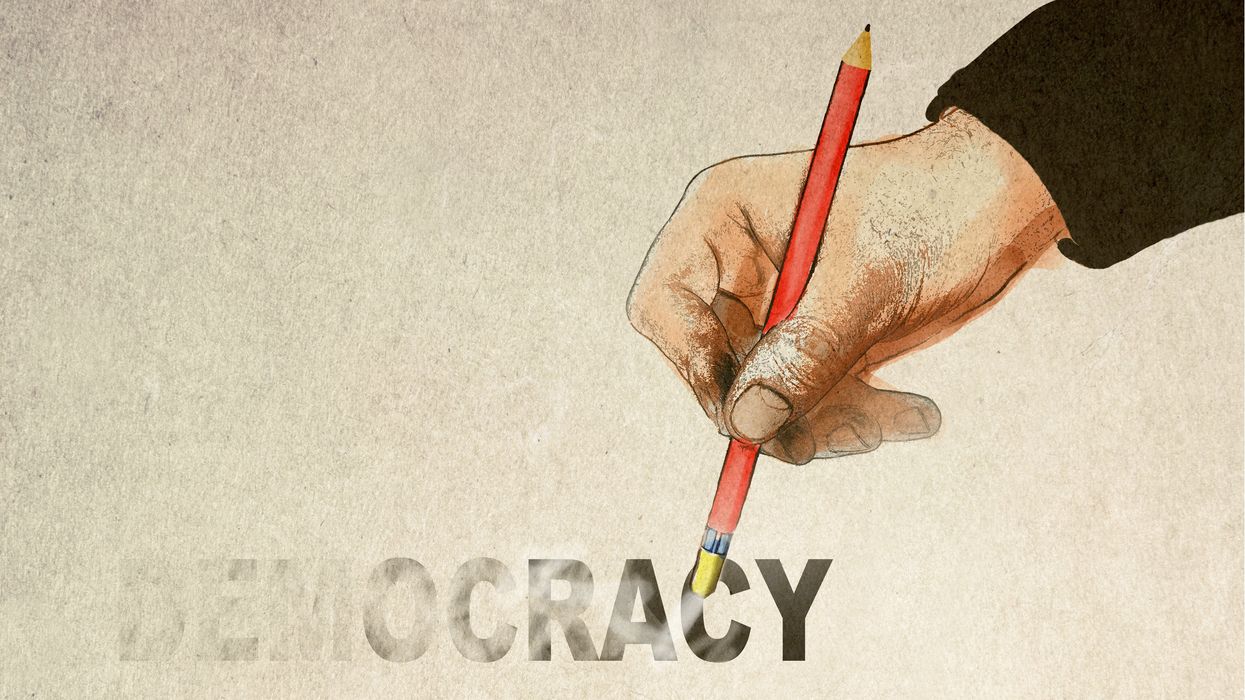Singer is communications lead at Philanthropy for Active Civic Engagement.
The term "democracy" has become a focal point in American politics, with Democrats and Republicans viewing it through different lenses. A term that once united Americans now has the potential to divide them … or lose them.
“They talk about democracy, I’m a threat to democracy. They’re the threat to democracy,” former President Donald Trump said during the debate with Vice President Kamala Harris. One recent study found that members of both parties believe their opponents are highly likely to subvert democratic norms. Other polls show that the state of democracy trails far behind other issues considered most important by voters in 2024.
For leaders and organizations engaged in American politics and civic life, understanding the nuanced perceptions of "democracy" is crucial. We can no longer assume a shared understanding or interpretation of this fundamental concept, nor that touting it is going to inspire everyday people. New data from PACE's Civic Language Perceptions Project offers valuable insights for those still hoping to effectively use the term “democracy.”
CLPP’s findings reveal that 70 percent of American voters hold a “positive” view of the term democracy, suggesting it still has general appeal. However, its appeal isn't uniform across the political spectrum. Liberals and Democrats tend to view the term more favorably than conservatives and Republicans.

PACE also found that the conversation around "democracy" and "republic" continues to evolve across the political spectrum, with very conservative respondents preferring republic to democracy by 14 points while very liberal respondents prefer democracy to republic by a whopping 45 points.
These dynamics arose in the spring at the state Republican convention in Washington, where delegates approved a resolution urging members to refrain from using the term "democracy."
The resolution states: “We encourage Republicans to substitute the words ‘republic’ and ‘republicanism’ where previously they have used the word ‘democracy.” Every time the word ‘democracy’ is used favorably it serves to promote the principles of the Democratic Party, the principles of which we ardently oppose.”
It might surprise some that a relatively low percentage (17 percent) of CLPP participants selected democracy as their most positive term when given a choice of seven options, while over a quarter (27 percent) chose democracy as their most negative term. This suggests that while “democracy” is generally viewed favorably, it may not be the most compelling or motivating concept for many Americans. This dovetails with the observations of political analysts who note that the term is increasingly being trivialized among the general public, particularly among young voters. Many of these voters are skeptical about whether America genuinely operates as a functioning democracy.
The term "democracy" may evolve further during and after the upcoming elections. As political tensions rise, it is possible that partisan interpretations of the word will become more entrenched. However, this doesn’t necessarily mean that leaders and organizations should abandon the term altogether. Despite diminishing confidence among both political parties that “democracy” will inspire voters, CLPP findings suggest that civic leaders should keep an open mind about the term. For example, CLPP found that the term is perceived more positively in 2023 (61 percent net positivity) than in 2021 (53 percent net positivity), with young people, independents and Black Americans seeing the most gains in positivity. The term also continues to be perceived more favorably by older Americans.
The challenge for civic leaders lies in reimagining how to use and define democracy to be more inclusive. CLPP found that liberals and conservatives emphasize different themes in their definitions of democracy, with liberals emphasizing the role of government as a tool for social justice and equality whereas conservatives highlighted the limits of government and the importance of individual liberty. Yet, there may be opportunities to promote shared values, such as fair elections, rejecting dictatorship and reducing political polarization, that resonate across political divides.
One might also cite a shared history of bipartisan support, spanning decades. In his Westminster Address, President Ronald Raegan said, “Democracy is not a fragile flower; still, it needs cultivating. If the rest of this century is to witness the gradual growth of freedom and democratic ideals, we must take actions to assist the campaign for democracy.” In his November 2022 remarks on standing up for democracy, President Joe Biden said, “From the very beginning, nothing has been guaranteed about democracy in America. Every generation has had to defend it, protect it, preserve it, choose it. … We must choose that path again.” Both emphasize that democracy is worth whatever effort and vigilance is required to protect and nurture it.
The way Americans think about "democracy" is evolving. While many still have a positive view of the term, it is essential that leaders rethink when, how and with whom they use the term, cognizant that it has the potential to unite as well as divide people across the political spectrum.










 A woman prepares to cast her vote on May 4, 2025 in Bucharest, Romania. The first round of voting begins in the re-run of Romania's presidential election after six months since the original ballot was cancelled due to evidence of Russian influence on the outcome. Then far-right candidate Calin Georgescu surged from less than 5% days before the vote to finish first on 23% despite declaring zero campaign spending. He was subsequently banned from standing in the re-rerun, replaced this time round by George Simion who claims to be a natural ally of Donald Trump.Getty Images, Andrei Pungovschi
A woman prepares to cast her vote on May 4, 2025 in Bucharest, Romania. The first round of voting begins in the re-run of Romania's presidential election after six months since the original ballot was cancelled due to evidence of Russian influence on the outcome. Then far-right candidate Calin Georgescu surged from less than 5% days before the vote to finish first on 23% despite declaring zero campaign spending. He was subsequently banned from standing in the re-rerun, replaced this time round by George Simion who claims to be a natural ally of Donald Trump.Getty Images, Andrei Pungovschi








Trump & Hegseth gave Mark Kelly a huge 2028 gift